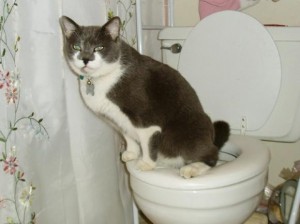Avoid Flush Cat Poop Down Your Toilet - Preserve Your Home's Plumbing Integrity
Avoid Flush Cat Poop Down Your Toilet - Preserve Your Home's Plumbing Integrity
Blog Article
Here in the next paragraph you can find a bunch of brilliant tips in regards to How to Dispose of Cat Poop and Litter Without Plastic Bags.

Introduction
As feline owners, it's essential to be mindful of just how we throw away our feline friends' waste. While it may seem practical to purge cat poop down the toilet, this technique can have damaging consequences for both the setting and human health.
Alternatives to Flushing
Fortunately, there are much safer and a lot more accountable means to dispose of feline poop. Think about the complying with alternatives:
1. Scoop and Dispose in Trash
The most common method of disposing of feline poop is to scoop it into a naturally degradable bag and toss it in the trash. Be sure to use a specialized clutter inside story and deal with the waste promptly.
2. Usage Biodegradable Litter
Choose biodegradable pet cat clutter made from products such as corn or wheat. These trashes are environmentally friendly and can be securely gotten rid of in the trash.
3. Hide in the Yard
If you have a yard, consider hiding feline waste in a designated area far from vegetable gardens and water sources. Make certain to dig deep sufficient to avoid contamination of groundwater.
4. Install a Pet Waste Disposal System
Buy a pet dog garbage disposal system particularly created for cat waste. These systems utilize enzymes to break down the waste, minimizing odor and ecological influence.
Health and wellness Risks
In addition to environmental worries, purging cat waste can also present health risks to people. Cat feces may include Toxoplasma gondii, a parasite that can cause toxoplasmosis-- a possibly extreme illness, particularly for expectant ladies and people with weakened body immune systems.
Ecological Impact
Purging pet cat poop introduces harmful pathogens and parasites right into the water, posing a significant threat to marine communities. These pollutants can adversely influence aquatic life and concession water quality.
Final thought
Accountable animal ownership expands beyond giving food and shelter-- it additionally includes appropriate waste administration. By avoiding purging feline poop down the commode and choosing different disposal techniques, we can lessen our ecological footprint and secure human health and wellness.
Why You Should Never Flush Cat Poop Down the Toilet
A rose by any other name might smell as sweet, but not all poop is created equal. Toilets, and our sewage systems, are designed for human excrement, not animal waste. It might seem like it couldn’t hurt to toss cat feces into the loo, but it’s not a good idea to flush cat poop in the toilet.
First and foremost, assuming your cat uses a litter box, any waste is going to have litter on it. And even the smallest amount of litter can wreak havoc on plumbing.
Over time, small amounts build up, filling up your septic system. Most litter sold today is clumping; it is made from a type of clay that hardens when it gets wet. Ever tried to scrape old clumps from the bottom of a litter box? You know just how cement-hard it can get!
Now imagine just a small clump of that stuck in your pipes. A simple de-clogger like Drano isn’t going to cut it. And that means it’s going to cost you big time to fix it.
Parasitic Contamination
Believe it or not, your healthy kitty may be harboring a nasty parasite. Only cats excrete Toxoplasma in their feces. Yet it rarely causes serious health issues in the cats that are infected. Most people will be fine too if infected. Only pregnant women and people with compromised immune systems are at risk. (If you’ve ever heard how women who are expecting are excused from litter cleaning duty, Toxoplasma is why.)
But other animals may have a problem if infected with the parasite. And human water treatment systems aren’t designed to handle it. As a result, the systems don’t remove the parasite before discharging wastewater into local waterways. Fish, shellfish, and other marine life — otters in particular — are susceptible to toxoplasma. If exposed, most will end up with brain damage and many will die.
Depending on the species of fish, they may end up on someone’s fish hook and, ultimately on someone’s dinner plate. If that someone has a chronic illness, they’re at risk.
Skip the Toilet Training
We know there are folks out there who like to toilet train their cats. And we give them props, it takes a lot of work. But thanks to the toxoplasma, it’s not a good idea.

As a person who reads about How to Dispose of Cat Poop and Litter Without Plastic Bags, I figured sharing that short article was beneficial. Liked our article? Please share it. Let other people discover it. I am grateful for your time. Visit us again soon.
Request An Appointment Report this page